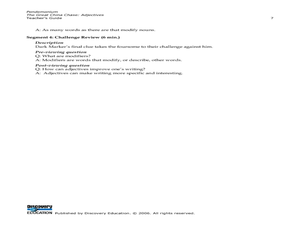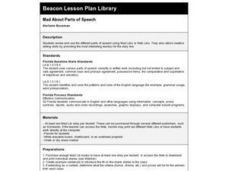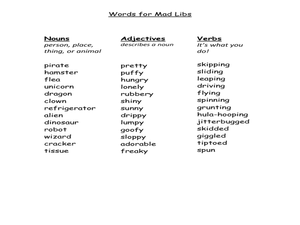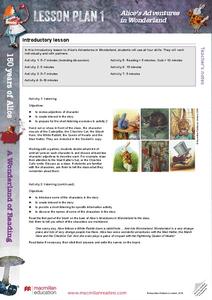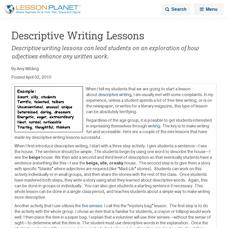Curated OER
The Great China Chase: Adjectives
Stories are created, by students, using a variety of adjectives. 3-5th graders will learn about adjectives and use their new knowledge to create ad-lib stories to share with the class demonstrating their mastery of adjectives, indefinite...
Curated OER
Sparkle Words
Students are introduced to "sparkle words," which are really adjectives! They consider ten sentences which have a word missing, and choose the best of the three sparkle words on the slide to complete the sentence. A nice, motivating...
Curated OER
Mad About Parts of Speech
Eighth graders review and use the different parts of speech using Mad Libs or Web Libs. They also utilize creative writing skills by providing the most interesting word(s) for the story line. They utilize worksheets imbedded in this plan.
Curated OER
Double Comparatives
In this adjectives worksheet, learners review and discuss what double comparative are and how to use them correctly in sentences. Students fill in the blanks with double comparative adjectives in nine sentences.
Curated OER
Student Mad Libs
Students investigate the different parts of speech by participating in a fill in the blank activity. In this Mad Libs lesson, students define the different parts of speech and discuss how they are used appropriately in sentences....
Curated OER
You
In this emotions instructional activity, students look at 4 faces with corresponding adjectives such as happy, sad, mad, and sleepy. Students complete 4 questions about the pictures.
Curated OER
Mardi Gras Madness
CStudents create a sensory chart in on the topic of Mardi Gras. They design a brainstorm web using Inspiration and complete creative writing assignment. Students write a poem about Mardi Gras that is presented to the class at the final...
Curated OER
Toma Rivera Mad Lib
For this mad lib worksheet, students fill in blanks with designated parts of speech to complete a "story." Words to use are categorized and appear on page 2.
Curated OER
Ed/Ing Emotion Adjectives
In this emotion adjective worksheet, students read a situation and see how the writer feels. Each adjective is written with an -ed ending and an -ing ending.
Macmillan Education
Alice's Adventures in Wonderland
Follow Alice as she travels through Wonderland with a set of lessons based on the first chapter of the book. Learners discuss key moments and ideas from chapter 1 before answering a series of comprehension questions about what they have...
Curated OER
Reading a Classic Novel
Charles Dickens offers an excellent example of sensory writing in this reading comprehension worksheet. Learners read excerpts from the novel Hard Times in which he describes the New England industrial city of Coketown. They consider why...
Curated OER
Descriptive Writing Lessons
Descriptive writing lessons can lead students on an exploration of how adjectives enhance any written work.
Curated OER
T'was the Night Before Christmas (Poem)
Students read the poem T'was the Night Before Christmas, and then partner with another student to complete a poem of their own based on the original. The new poem has missing words and students fill in the missing parts of speech like a...
Curated OER
Pizza Pizza
In this parts of speech worksheet, students read a story about the history of pizza that has missing words. Following the directions to put in adjectives, nouns or other words, students complete the story so that it makes sense.
Curated OER
Emotions: ACE English Program
Middle schoolers respond to prompts about emotions. For this ESL/ELL lesson, students develop an understanding of vocabulary and feelings associated with emotions. They identify emotions on flashcards, in magazines, and on worksheets.


